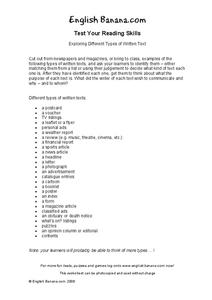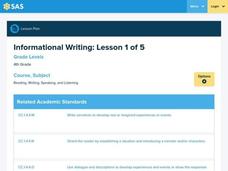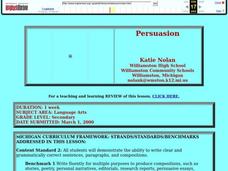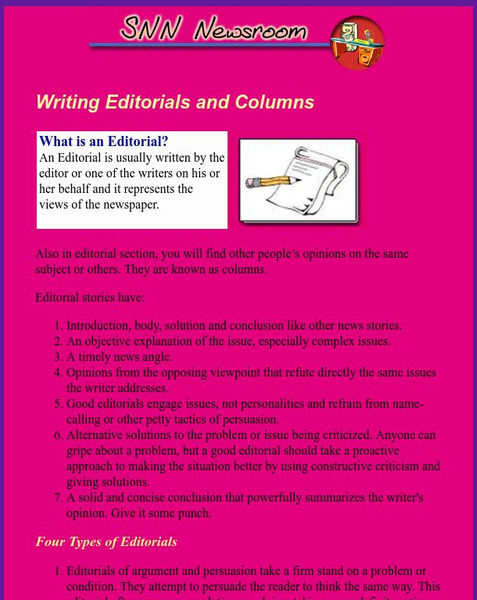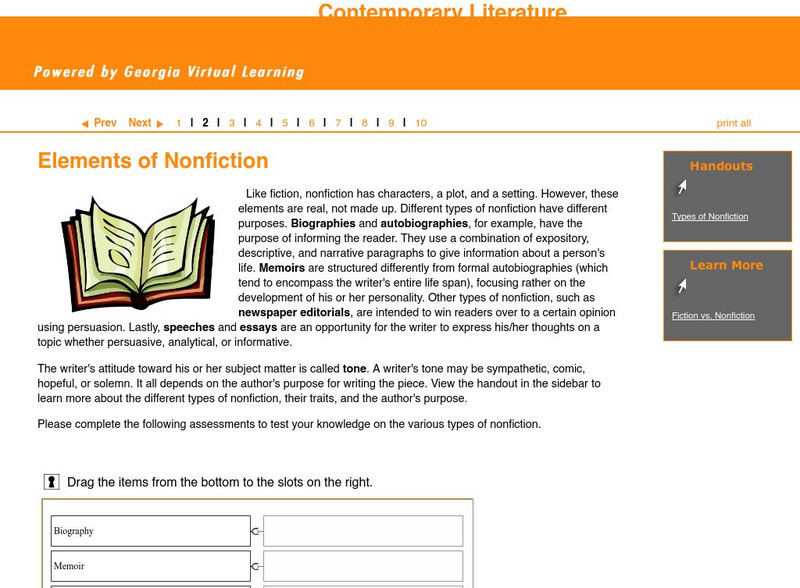Newseum
Editorials and Opinion Articles
Reading the news is fun, and that's a fact! With the lesson plan, scholars differentiate between fact and opinion as they read editorial articles. They complete a worksheet to analyze the information before writing their own editorials...
Curated OER
The Editorial Revisited
Students identify different types of editorials. They explain, using a graphic organizer, the elements that make an editorial powerful. They offer elements they came up with and the examples and list them on the board.
Curated OER
Learning Types of Editorials - and Writing Some
Young scholars recognize and differentiate between the three types of editorials in order to write editorials for the school newspaper. In this editorials instructional activity, students read example persuasive and interpretative...
Curated OER
Editorial Writing
Students Write a persuasive essay that contains effective introductory and summary statements; arranges the arguments effectively; and fully develops the ideas with convincing proof, details, facts, examples, and descriptions. They write...
Chandler Unified School District
Satire: The Art of Indirect Persuasion
A free press is entitled to its opinions. While the news pages report the facts of events, editorial pages feature writers' and cartoonists' opinions about events to either directly or indirectly persuade. Introduce viewers to the art of...
Curated OER
Exploring Different Types of Written Text
In this text analysis worksheet, students examine different types of texts and identify each one by matching them from a list. Students determine what each text communicates and for whom.
Curated OER
Exploring Media: Understanding and Identifying Editorial Perspective in Television and Radio News
Young scholars research the topics Boat People: A Refugee Crisis, Dr. Henry Morgentaler: Fighting Canada's Abortion Laws, and CANDU: The Canadian Nuclear Reactor on the CBC Radio and Television Archives Web site.
American Press Institute
Introductory News Literacy
Aspiring journalists learn about media literacy, journalism, and the press. Units come complete with handouts, assignment rubrics, notes, and extension suggestions. Each unit also comes with a list of vocabulary words and learning...
Curated OER
Propaganda Techniques
Sixth graders locate examples of persuasive writing. For this persuasive writing lesson students work in a groups to identify and analyze the use of propaganda techniques. Students use newspapers to find editorials, or advertisements,...
West Virginia Department of Education
Technical Writing: Real-World Writing in the 21st Century
Wondering how to respond to the age-old question when will I ever use this? The answer is very simple when discussing technical writing. Teachers and administrators gain an understanding of using technical writing in the classroom....
Prestwick House
New (March 2016) SAT Writing and Language Test Practice
Prepare class members for the SAT Writing and Language exam with a practice test that prepares students for the types of questions and the kind of language used in the exam. Test takers must select the best way to fix poorly...
Curated OER
Macbeth News Broadcast
Here is an authentic assessment task for Shakespeare's Macbeth. Young literature scholars prepare, perform, and record a news broadcast about the major events in the play. For example, groups may choose to report on the death of Lady...
Pennsylvania Department of Education
Informational Writing
Emerging writers identify an informational piece of writing. They are provided with examples of informational writing and view a PowerPoint on narrative writing. Then, they design their own informational writing with a brochure,...
Curated OER
What's Wrong - Intensive Reading
There are different types of reading meant for different texts. Discuss four of these with your emerging readers. When does one perform an extensive or intensive reading? When does one skim or scan a text? How are these all different?
Curated OER
Mr.Bubble's News
Second graders use a double bubble thinking map to compare newspapers and magazines. They browse through magazines and newspapers to identify characteristics of each type of text and find 5 features for each type of text. They share...
Curated OER
Vocabulary Charts
Learners create their own vocabulary charts. They divide into groups and view an example of a vocabulary chart imbedded in this plan. Then, they create their own chart which is based on a particular subject area.
Curated OER
Error Correction
Students are given an example of a biography and they are to find the mistakes. They are to use proofreading marks to mark the errors.
Curated OER
Forms Of Knowledge
Students put writing pieces into categories to show different organizational features in writing. In this writing lesson plan, students are shown examples of speeches, poems, editorials, cartoons, parodies, historical fiction, and more.
Curated OER
Poetry
Students apply reading comprehension skills to poetry and synthesize the information to create a new piece of work.
Curated OER
Subject and Object Questions
Learners gain practice asking direct questions. They recognize the difference between subject and object questions. After a lecture/demo, students work in small groups and use a worksheet imbedded in this plan to gain practice.
Curated OER
Putting Together the Confederation Newspaper
Students create a four-page newspaper that represents their assigned region/province of Canada. They assess their individual contribution to the group in the creation of their newspaper.
Curated OER
Persuasion
Young scholars explore the characteristics of a persuasive letter. They label each characteristic and they create a persuasive letter using the correct business letter format. Students recommend a school rule or change of a rule and...
Other
Snn Newsroom: Reporter's Toolbox: Writing Editorials and Columns
Advice and examples of editorial and feature column writing, along with an explanation of the role that editorial writers and columnists fill. Explains how to structure this type of writing in order to present clear arguments.
Georgia Department of Education
Ga Virtual Learning: Contemporary Nonfiction: Elements of Nonfiction
This lesson focuses on the elements of nonfiction including types of nonfiction such as biographies, autobiographies, memoirs, newspaper editorials, speeches, and essays. It features links to a chart of the types of nonfiction and an...





